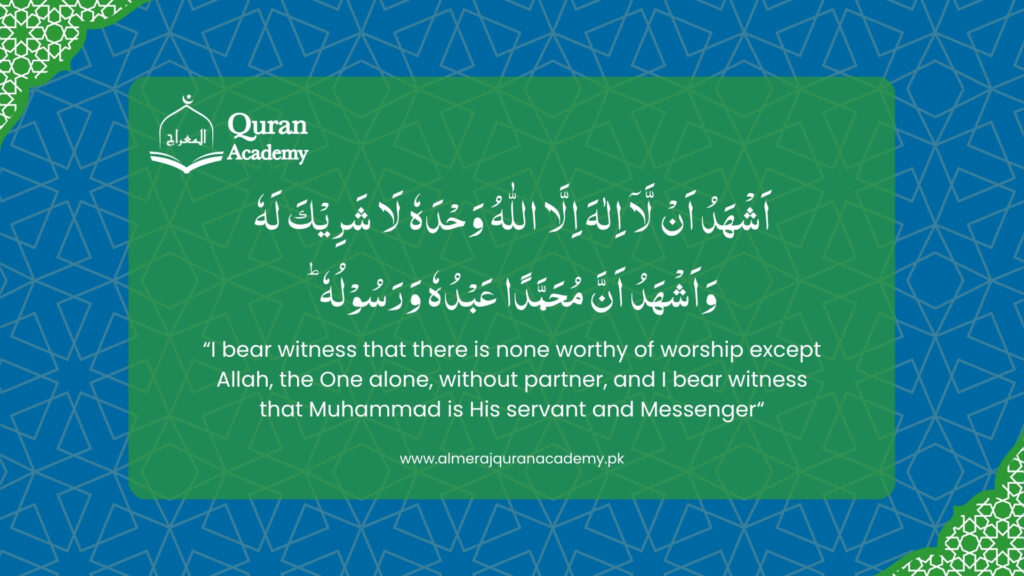Second Kalma
Kalima Shahadat
Kalima Shahadat or Kalimat ash-Shahādah (كَلِمَاتْ اَلشَّهَادَة) is known as the Second Kalima. The term “Shahadah” in Arabic means “witness” or “testimony.” Like the First Kalima (Kalima Tayyabah), this one also consists of two distinct parts.
The first part is a declaration of the oneness of Allah (سُبْحَانَهُ وَتَعَالَى), while the second part affirms the Prophethood of Muhammad ﷺ. Together, the first and second Kalimas form the complete foundation of a Muslim’s faith. While the First Kalima expresses the belief, the Second Kalima serves as a testimony to that belief. Muslims often recite the Second Kalima along with the First as part of their daily spiritual practice.
By reciting the Second Kalima, a person gives their testimony (Shahadah) that Allah (سُبْحَانَهُ وَتَعَالَى) alone is worthy of worship, and that Muhammad ﷺ is His servant and messenger. Reciting both Kalimas regularly is essential for affirming and completing one’s faith. Therefore, anyone embracing Islam is required to recite these two Kalimas as part of their acceptance of the religion.
In many Muslim communities—particularly in South Asia—these Kalimas are among the first religious teachings given to children, forming the foundation of their Islamic understanding from an early age.
Shahadah (Word of Evidence)
Ash-hadu Al-laaa Ilaaha Illa-llaahu Wahdahoo Laa Shareeka Lahoo Wa-Ash-hadu Anna Muhammadan Abduhoo Wa Rasooluhu
''I bear witness that (there is) no god except Allah; One is He, no partner hath He, and I bear witness that Muhammad [PBUH] is His Servant and Messenger.''
اَشْهَدُ اَنْ لَّآ اِلٰهَ اِلَّا اللّٰهُ وَحْدَهٗ لَا شَرِيْكَ لَهٗ وَاَشْهَدُ اَنَّ مُحَمَّدًا عَبْدُهٗ وَرَسُوْلُهٗ

The Significance of Kalima Shahadat – Second Kalima
The Second Kalima, known as Kalima Shahadat (کلمہ شہادت), holds a central place in a Muslim’s faith. It is a testimony that affirms our belief in the Oneness of Allah سُبْحَانَهُ وَتَعَالَى and acknowledges the Prophethood of Muhammad ﷺ. By declaring this, we distance ourselves from any form of shirk (associating partners with Allah) and remove all doubts (shakk) from our faith.
Core Beliefs Contained in Kalima Shahadat
When a Muslim recites this Kalima, they bear witness to the following five key truths:
Allah سُبْحَانَهُ وَتَعَالَى is the One and Only God.
He has no partner or equal.
Only Allah is worthy of worship.
Muhammad ﷺ is His last Messenger.
The Prophet Muhammad ﷺ is also His servant (‘Abd – عَبْدُ).
Without believing in and testifying to these core tenets, a Muslim’s Imaan (faith) remains incomplete.
Reciting Kalima Shahadat – When & Where?
Unlike some other acts of worship, the Second Kalima can be recited anytime, anywhere, and as frequently as one wishes. In many South Asian cultures, this Kalima is often recited near someone who is on their deathbed to ease the soul’s departure. It is also commonly read during difficult times for peace and comfort.
How Often Should We Recite Kalima Shahadah?
There is no fixed number. You can:
Recite it a few times daily, or
Recite it hundreds of times during your regular activities — while working, driving, or even resting.
Living the Message of Kalima Shahadat
While reciting this Kalima carries many blessings, the true spirit lies in living by its message. This Kalima reminds us to:
Worship only Allah سُبْحَانَهُ وَتَعَالَى
Seek guidance only through the Qur’an and Sunnah
Follow the life and teachings of the Prophet Muhammad ﷺ in our dealings, worship, and relationships
The more we practice what we recite, the more we elevate our Imaan and character.
Benefits of the Kalima Shahadat Based on the Quran and Hadith
The immense value of this Kalima is clearly stated in Hadith No. 57 from Bulugh al-Maram:
Translation – Allah’s Messenger (ﷺ) said:
“If one after performing ablution completely recites the following supplication: (Ash-hadu an la ilaha ill-Allahu wahdahu la sharika lahu, wa ash hadu anna Muhammadan ‘abduhu wa Rasuluhu) ‘I testify that there is no one worthy of worship but Allah, He is Alone and has no partner and Muhammad (ﷺ) is his slave and Messenger’, all the eight gates of Paradise will be opened for him and he may enter through any gate he wishes”.
[Bulugh al-Maram: Hadith 57]
This powerful Kalima is also an integral part of the Adhan (call to prayer). As narrated in Ibn Majah Hadith 709:
Translation:
The Messenger of Allah taught me the Adhan with nineteen phrases and the Iqamah with seventeen. (Allah is the Most great, Allah is the most Great, Allah is the most Great, Allah is the most Great; I bear witness that none has the right to be worshipped but Allah, I bear witness that none has the right to be worshipped but Allah; I bear witness that Muhammad is the Messenger of Allah, I bear witness that Muhammad is the Messenger of Allah; I bear witness that none has the right to be worshipped but Allah, I bear witness that none has the right to be worshipped but Allah; I bear witness that Muhammad is the Messenger of Allah, I bear witness that Muhammad is the Messenger of Allah; Come to the Prayer, Come to the Prayer; Come to the prosperity, Come to the prosperity; Allah is the Most great, Allah is the Most Great; None has the right to be worshipped but Allah). And the Iqamah is seventeen phrases: (Allah is the Most great, Allah is the most Great, Allah is the most Great, Allah is the most Great; I bear witness that none has the right to be worshipped but Allah, I bear witness that none has the right to be worshipped but Allah; I bear witness that Muhammad is the Messenger of Allah, I bear witness that Muhammad is the Messenger of Allah; Come to the Prayer, Come to the Prayer; Come to the prosperity, Come to the prosperity; The prayer is about to begin, the prayer is about to begin; Allah is the Most great, Allah is the Most Great; None has the right to be worshipped but Allah).”
[Ibn Majah 709]
Some of the beautiful rewards of reciting this Kalima include:
Makes death easier and more peaceful
Brings comfort and expansion in the grave
Leads to Allah’s pleasure and mercy
Grants the reciter a place among the righteous in Paradise
Opens the gates of Jannah, as mentioned in Hadith

